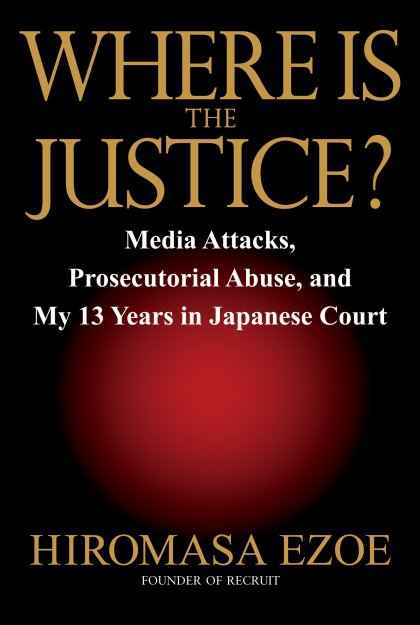Kodansha USA
Where is the Justice?
Where is the Justice?
Couldn't load pickup availability

Collapsible content
ABOUT
As the other mainstream newspapers also began reporting on seemingly-suspicious stock transfers by a Recruit subsidiary to bureaucrats and prominent politicians, an angry public turned on founder and President Ezoe, setting him up as the villain, although the transactions were, actually, legal. Soon, Ezoe was detained by the Tokyo District Public Prosecutors Office, and harshly interrogated. There was no concrete evidence against Ezoe, but the sensational reports in the newspapers, TV new programs, and weekly magazines fanned the public's fury and encouraged the prosecutors to pressure a confession out of him. Ultimately, many top LDP politicians were linked to the scandal, and the Takeshita cabinet quit en masse the following year. Mentally and physically exhausted, Ezoe signed the interrogation records. He was given a suspended sentence, and resigned from the business he had founded as a Tokyo University student.
Where is the Justice? is Hiromasa Ezoe's detailed and candid look at the Recruit Affair and the part he played in it. More than that, however, it is a sharp indictment of what the Los Angeles Times called, "the pervasive political dishonesty and rampant profiteering at the heart of the system..." Many experts on contemporary Japanese politics say that, in retrospect, the Recruit Affair was a significant turning point in Post-War Japan, as the Bubble Economy became the Lost Decade. Ezoe offers a unique perspective on these events, from which we, today, can draw important lessons about ethics, accountability, transparency, and the often dangerously entwined roles of policy makers, policy enforcers - and those who report and manipulate public opinion.
PRE-ORDER
Secure the best deal by acting fast! Our Pre-Order promo offers unbeatable prices on must-have items. Be quick to lock in the lowest cost before the promo ends.
The best part? You won't be charged until your item is ready to ship. This means you can reserve your product at the best price without immediate payment. Whether you're first in line or just ahead of the crowd, you're making a smart choice. Reserve your item now and enjoy the benefits of being an early buyer, with the added flexibility of delayed payment!
STANDARD, PRIMARY, DM AND VARIANT COVERS
Standard and Primary covers are widely available through general retailers. They often have higher print runs and can be cheaper, especially during sales.
In contrast, Direct Market (DM) and variant covers are primarily sold in comic shops. DM editions tend to have more limited availability and may be more valuable to collectors.
The main differences lie in artwork style, availability, price, and collector appeal. Ultimately, the choice between standard and variant covers depends on personal preference, budget, and individual collecting goals.
PRODUCT TYPES
Comic book enthusiasts have various formats to choose from when collecting their favorite stories.
Here's a brief overview of the main types:
Omnibus
- Large, hardcover collections
- Usually contain complete runs or extensive story arcs
- Typically 800-1000+ pages
- Higher price point, often €100-€150
Oversized Hardcover (OHC)
- Similar dimensions to omnibus, but thinner
- Collect shorter runs or story arcs
- Usually 300-600 pages
- Priced between €30-€50
Hardcover (HC)
- Standard-sized hardcover books
- Collect 6-12 issues typically
- Similar dimensions to single issues, but with a hard cover
- Priced around €25-€35
Trade Paperback (TP)
- Softcover collections
- Standard comic book size
- Usually collect 4-6 issues
- Most affordable option, typically €15-€25
Other Formats
- Absolute Editions: Oversized, deluxe hardcovers (mainly DC Comics)
- Compendiums: Massive paperback collections
- Graphic Novels (OGN/GN): Original stories not previously released as single issues
The choice between these formats often depends on personal preference, budget, and collecting goals. Omnibus and OHC editions offer larger artwork and more content but at a higher price, while TPs provide a more affordable way to collect complete story arcs

